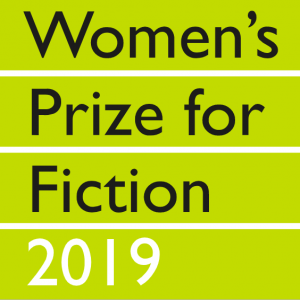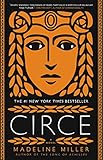
The Women’s Prize for Fiction announced its 2019 shortlist.
Formerly the Orange Prize and Baileys Prize, the Women’s Prize for Fiction recognizes the best English-language novel by a woman published in the U.K. in the previous year. The award celebrates “excellence, originality and accessibility in women’s writing from throughout the world.”
The shortlist includes one debut author (Oyinkan Braithwaite), one previously shortlisted author (Anna Burns), a previous Orange Prize for Fiction winner (Madeline Miller), and an Orange Award for New Writers winner (Diana Evans). The list also includes a few Year in Reading alums, and all the books were featured in our 2018 First-Half and Second-Half Book Previews.
 The Silence of the Girls by Pat Barker
The Silence of the Girls by Pat Barker
Read Publishers Weekly’s review here: Barker, author of the Booker-winning The Ghost Road, speculates about the fate of the women taken captive during the Trojan War, as related in Homer’s Iliad. Briseis, queen of the small country of Lyrnessus, was captured by the Greek forces and awarded to Achilles, fated to serve him as slave and concubine. Through her eyes readers see the horror of war: the sea of blood and corpses, the looting, and the drunken aftermath of battle. When Agamemnon demands that Briseis be handed over to him, Achilles reacts with rage and refuses to fight, and when his foster brother and lover Patrocles is killed, having gone into battle in Achilles’s stead, Briseis becomes the unwitting catalyst of a turning point in the war. In Barker’s hands, the conflict takes on a new dimension, with revisionist portraits of Achilles (“we called him the butcher”) and Patroclus (he had “taken his mother’s place” in Achilles’s heart). Despite its strong narrative line and transportive scenes of ancient life, however, this novel lacks the lyrical cadences and magical intensity of Madeline Miller’s Circe, another recent revising of Greek mythology. The use of British contemporary slang in the dialogue is jarring, and detracts from the story’s intensity. Yet this remains a suspenseful and moving illumination of women’s fates in wartime.
 My Sister, the Serial Killer by Oyinkan Braithwaite
My Sister, the Serial Killer by Oyinkan Braithwaite
Here’s what Publishers Weekly’s starred review had to say: Braithwaite’s blazing debut is as sharp as the knife that twists in the chest of Femi, the now-dead boyfriend of Ayoola, whose boyfriends, curiously, seem to keep winding up dead in her presence. Femi makes dead boyfriend number three—each were killed in self-defense, according to Ayoola—and, per usual, Ayoola’s older sister, Korede, is called upon to help dispose of the body. The only confidante Korede has is a coma patient at the Lagos hospital where she works, which is the only place she can go to escape Ayoola. It is also where she can see the man she loves, a handsome and thoughtful doctor named Tade. Of course, this means that when the capricious Ayoola decides to start visiting her sister at work, she takes notice of him, and him of her. This is the last straw for Korede, who realizes she is both the only person who understands how dangerous her sister is and the only person who can intervene before her beloved Tade gets hurt, or worse. Interwoven with Korede, Ayoola, and Tade’s love triangle is the story of Korede and Ayoola’s upbringing, which is shadowed by the memory of their father, a cruel man who met a tragic and accidental death—or did he? As Korede notes when she considers her own culpability in her sister’s temperament: “His blood is my blood and my blood is hers.” The reveal at the end isn’t so much a “gotcha” moment as the dawning of an inevitable, creeping feeling that Braithwaite expertly crafts over the course of the novel. This is both bitingly funny and brilliantly executed, with not a single word out of place.
 Milkman by Anna Burns
Milkman by Anna Burns
Here’s Publishers Weekly’s starred review: In her Booker-winning novel, Burns (No Bones) gives an acute, chilling, and often wry portrait of a young woman—and a district—under siege. The narrator—she and most of the characters are unnamed (“maybe-boyfriend,” “third brother-in-law,” “Somebody McSomebody”)—lives in an unspecified town in Northern Ireland during the Troubles of the 1970s. Her town is effectively governed by paramilitary renouncers of the state “over the water,” as they call it. The community is wedged between the renouncers, meting out rough justice for any suspected disloyalty, and the state’s security forces. One day, “milkman,” a “highranking, prestigious dissident” who has nothing to do with the milk trade, offers the narrator a ride. From this initial approach, casual but menacing, the community, already suspicious of her for her “beyond-the-pale” habit of walking and reading 19th-century literature, assumes that she is involved with the rebel. Milkman, however, is in essence stalking her, and over the course of several months she strives, under increasing pressure, to evade his surveilling gaze and sustained “unstoppable predations.” There is a touch of James Joyce’s Stephen Dedalus in the narrator’s cerebral reticence, employing as she does silence, exile, and cunning in her attempt to fly the nets of her “intricately coiled, overly secretive, hyper-gossippy, puritanical yet indecent, totalitarian district.” Enduring the exhausting “minutiae of invasion” to which she is subjected by milkman, and the incursion of the Troubles on every aspect of life, the narrator of this claustrophobic yet strangely buoyant tale undergoes an unsentimental education in sexual politics. This is an unforgettable novel.
 Ordinary People by Diana Evans
Ordinary People by Diana Evans
Read what Publishers Weekly had to say: Evans’s striking novel (following 26A) investigates the relationships of two sets of friends as they navigate pivotal moments during 2008. Melissa and Michael remain engaged after 13 years; Melissa misses her former job as a magazine’s fashion editor, which she left to care for her seven-year-old, Ria, and infant, Blake, while Michael longs for the passionate relationship they used to have. Continually feeling rebuffed at home, Michael searches for attention from others and notices a younger woman in his office. Hesitant to be unfaithful, Michael plans an outing to connect with Melissa, but the evening falls short of expectations and Melissa withdraws further. Meanwhile, in the second narrative, Michael’s friend Damian is frustrated with Stephanie, his wife of nearly 16 years, because she refuses to live in London like their friends, opting instead to raise their children in the suburbs, thereby squelching his dream of city life and ambition of being a writer. Along with coping with the recent loss of his activist father, Damian believes his wife and her family don’t share his values, and instead measure their success by the size of their home and the private lessons they provide their children. With penetrating emotional and psychological observations, Evans creates a realistic portrayal of the couples as they struggle to redefine commitment. Readers looking for careful studies of relationship dynamics will find much to contemplate.
 An American Marriage by Tayari Jones
An American Marriage by Tayari Jones
Read Publishers Weekly’s review: Jones (Silver Sparrow) lays bare the devastating effects of wrongful imprisonment in this piercing tale of an unspooling marriage. Roy, an ambitious corporate executive, and Celestial, a talented artist and the daughter of a self-made millionaire, struggle to maintain their fledgling union when Roy is sentenced to 12 years in prison on a rape charge he is adamant is false. Before Roy’s arrest, the narrative toggles between his and Celestial’s perspectives; it takes an epistolary form during his imprisonment that affectingly depicts their heartbreaking descent into anger, confusion, and loneliness. When Roy is proven innocent and released seven years early, another narrator is introduced: Andre, Celestial’s lifelong best friend who has become very close to her while Roy has been away. Jones maintains a brisk pace that injects real suspense into the principal characters’ choices around fidelity, which are all fraught with guilt and suspicion, admirably refraining from tipping her hand toward one character’s perspective. The dialogue—especially the letters between Roy and Celestial—are sometimes too heavily weighted by exposition, and the language slides toward melodrama. But the central conflict is masterfully executed: Jones uses her love triangle to explore simmering class tensions and reverberating racial injustice in the contemporary South, while also delivering a satisfying romantic drama.
 Circe by Madeline Miller
Circe by Madeline Miller
Read Publishers Weekly’s starred review here: Miller follows her impressive debut (The Song of Achilles) with a spirited novel about Circe’s evolution from insignificant nymph to formidable witch best known for turning Odysseus’s sailors into swine. Her narrative begins with a description of growing up the awkward daughter of Helios, the sun god. She does not discover her gift for pharmakeia (the art of using herbs and spells) until she transforms her first love, a poor fisherman, into a god. When he rejects her in favor of vain Scylla, Circe turns Scylla into a sea monster. Now considered dangerous, Circe is exiled to an island, where she experiments with local flora and fauna. After returning from a visit to Crete to help her sister give birth to the Minotaur, Circe is joined on the island by errant nymphs sentenced to do their penance in her service. By the time Odysseus’s ship arrives, winding its way home from the Trojan War, Circe reigns over a prosperous household. Welcome guests enjoy her hospitality; unwelcome guests are turned into wild pigs. Neither the goddess Athena nor the deadliest poison known to man makes Circe flinch. Weaving together Homer’s tale with other sources, Miller crafts a classic story of female empowerment. She paints an uncompromising portrait of a superheroine who learns to wield divine power while coming to understand what it means to be mortal.
The winner will be announced on June 5.








